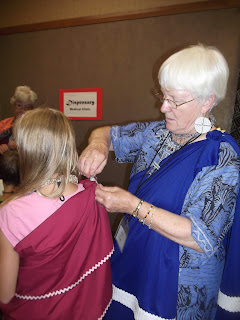Kuzunguka zunguka
This post was written by Mollie and Lyn MacLean
Bibi Joan and family dressing Maasai style
Last week we spent four energy-packed days sharing our
Tanzanian experience with twenty-five grade school students. It was not only a culture camp for the
students to get to know about four Tanzanian families (who we as adult leaders
know rather well); but it was also a cultural experience for our students to
get to know us, who are at least 50 years older than they are.
Bibi Mollie and the "Kahwage" family collect water
Each student was placed into one of the four Tanzanian
families groups. Each family group had a
picture of the family and some items commonly found in the home of that
specific family. We talked about life in
Tanzanian and life in that family: what
each family member does, how they dress, and the opportunities and challenges
for each family.
We talked about how few cars there were in Tungamalenga and
that our families walked a lot.
Question: Why didn’t they ride
their bicycles?
Answer: Bicycles are
very much like cars and few people have bicycles and even fewer have motor
bikes.
Question: What kind
of medicine do they have for ear infections?
Answer: Amoxicillin
Question: How did our
church find these people?
Answer: Our
relationship with the St Paul Area Synod of the ELCA
Babu Lyn and the Kilipamwambu family
Our students had daily chores of walking for water,
collecting water in a five-gallon bucket, and returning to fill their water
bottles. They gathered fire wood. They enjoyed looking at items for sale at the
Duka (store), wearing Tanzanian clothing, and grinding corn with a mortar and
pestle. They softened clay with their
bare feet and then transferred the clay to molds which formed bricks.
Tanzania
Mwugusi/Nurse Sharon with 'patients' at the dispensary
They visited the dispensary where they
learned about common medical emergencies and about malaria and the use of bed
nets to prevent malaria. They made
soccer balls from plastic shopping bags, made beaded bracelets, and made bottle
cap percussion instruments to be used with our Tanzanian drums in singing. They
learned basic Swahili words. Each day
the students were given snacks that were items available in
rolling bandages -- a favorite activity!
On the third day of camp our family group of six was visited
by another family group of six. There
was a bustle of getting each house in order for the visiting company. We shared the unique characteristics of each
family, where they lived, their home atmosphere, and their family members.
Each day we worked on learning some Swahili songs. The most challenging song included many
Swahili words and motions which seemed at first nearly impossible to sing, but
by the end of the four days, we were all singing with some degree of
expertise. Our students really enjoyed singing
along with a video of Tanzanian students singing the song. On the last day of camp one of my students
brought his phone to record the song so he could play it at home. What better way to end four days of learning
about our sister congregation than singing with them a song about singing with
the Lord, sitting with the Lord, eating with the Lord, greeting each other with
the Lord, and even jumping with the Lord.
Shikamoo -- Mara haba
words of honor and blessing shared from child to elder
I know that we keep thinking about our shared time with
these wonderful lively and curious students and we hope that our love for and
understanding of our Tanzanian sisters and brothers has been shared with our
SOTV students.











Comments
Post a Comment